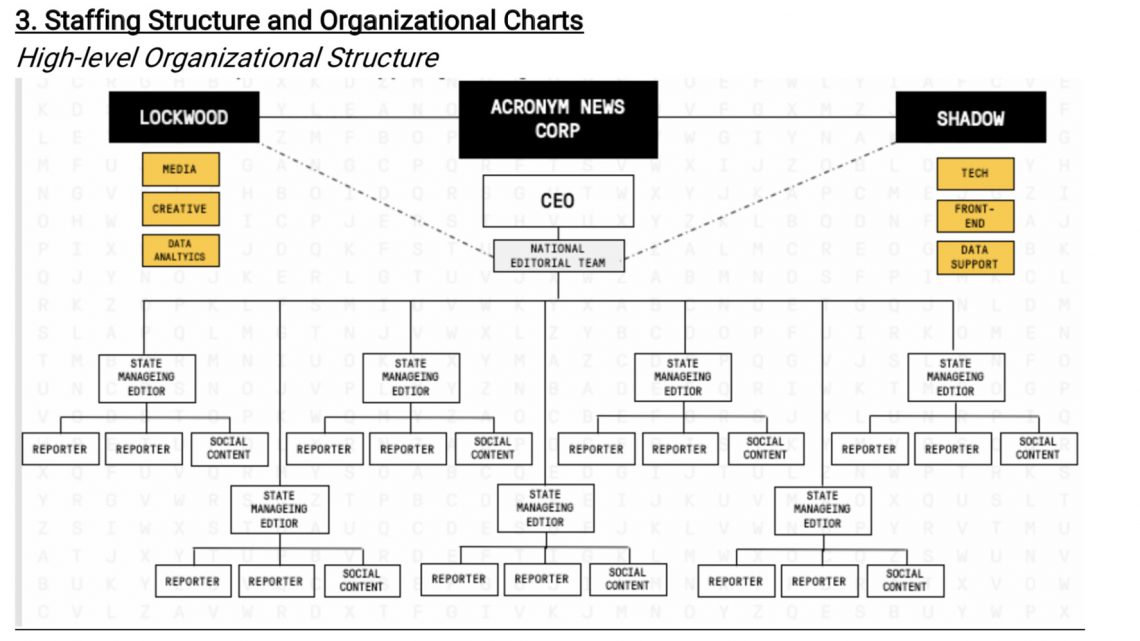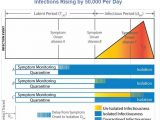
Docs: Shadow Inc. Directly Tied to Liberal Media Operation
February 7, 2020A company called Shadow earned instant infamy this week when an app it created to tabulate the results of the Iowa caucuses led to a statewide meltdown that has thrown the Democratic presidential campaign into disarray. In the wake of that disaster, a lot of people have a lot of questions about Acronym, a well-connected startup that’s tied to but has distanced itself from Shadow.
This week, Acronym founder Tara McGowan put out a statement describing Shadow as an independent company and Acronym as a mere investor; she also reportedly reached out to major Democratic donors like Steven Spielberg and J.J. Abrams to do damage control over Acronym’s role in the Iowa fiasco, and disclaimed any “day-to-day engagement with Shadow business.”
Do you work at Shadow or Acronym? We'd love to talk to you. Contact Anna Merlan at anna.merlan@vice.com or via VICE's SecureDrop.
A June 2019 draft business plan for Acronym written by McGowan and obtained by VICE, though, shows the companies as thoroughly entwined, with Shadow playing a key role in Acronym’s plans. As has been previously reported, Acronym’s goal is to create a pipeline pouring propaganda favorable to Democrats and liberal causes into swing states, ostensibly to combat the right wing's significantly more advanced media machine, which among other things comprises Fox News, Breitbart, and other operations advancing Republican interests. The document shows the news-like sites that comprise that pipeline as connected not just to Acronym and a Democratic consulting firm called Lockwood Strategies, but to Shadow itself, with an organizational chart showing ties between Shadow and the “national editorial team” of Acronym’s news operations.
“I'm taking one for the team by building progressive digital infrastructure," McGowan told VICE. “The fact that we are getting framed as nefarious for doing what the right has been doing is bullshit.”
The memo, titled “ACRONYM News Corp Rapid Build Plan 2019-2020,” was written by McGowan. In it, she writes that the plan to create a media operation was motivated by the realization that it’s more effective to create “news content” than to simply run ads for Democratic causes:
Over the past two years, ACRONYM has run dozens of seven-figure digital ad programs to reach voters where they are, incorporating experiments to test and identify the most effective strategies to persuade and mobilize voters online. One of the biggest lessons we learned through these programs was how much more effective boosting and targeting owned media and news content online was over pre-produced “ads” at influencing a voter’s support for or against a candidate or issue.
To that end, McGowan writes, Acronym plans to create a network of news outlets in Wisconsin, Arizona, Michigan, Pennsylvania, Virginia, North Carolina, and Florida—all “2020 battleground states,” as the document helpfully notes. McGowan proposes that while each news property will have its own “brand” and “small state-based editorial teams,” a national ACRONYM News Corp, led in part by a steering committee including, among others, Carley Roney, co-founder of The Knot, will have control:Though each property will have its own unique brand, name and small state-based editorial teams directing the framing of national and local political coverage, ACRONYM News Corp will have various centralized functions to ensure learnings are disseminated across the network for maximum impact, effectively scaling best practices.
Each property will pair original reporting and aggregated content with our ad placement and political targeting expertise to distribute these stories to strategic segments of voters before, during and between election cycles. Content designed to drive strategic narratives to key audiences will be delivered on a drip over time, reaching voters through targeted ads and boosted posts across Facebook, Instagram, Google, YouTube, Twitter and other online properties. The data collected from this network also allows ad programs to be continuously optimized to increase reach, engagement and persuasive lift among these audiences.
The plans in the memo, McGowan said, were simply plans; Acronym News Corp does not exist.
So far, Acronym says in the document, it owns three news outlets: The Dogwood in Virginia, The Copper Courier in Arizona, and UpNorthNews in Wisconsin. All three are owned by a company called Courier Newsroom, which discloses on its website that it is wholly owned by Acronym. (When asked to clarify the relationship between Shadow and Courier, an Acronym spokesperson said, “Shadow and Courier Newsroom share the same investor: ACRONYM.") Courier has been doing worthwhile work. Its EIC, Lindsey Schrupp—who used to work at VICE as editor-in-chief of Broadly—said:
While our progressive editorial viewpoint informs what stories we choose to cover, Courier Newsroom is not controlled by any candidate, political party, or political organization. I am proud to stand behind our work. It is unapologetically originally-reported, factual, local news content with a progressive lens.
This is in line with the document’s insistence that Acronym news operations won’t peddle what it calls “misinformation.” (”Our brand is truth,” McGowan writes.) While many journalistic outlets eschew false neutrality and cover news from a transparently-expressed point of view, though, what makes them journalistic entities is that they are independent, focused on describing the truth as best they can tell it and not on serving political interests. The mission of Acronym’s media operations is described, in the document, in a different way:
Our media properties will serve as channels to drive strategic national and local narratives year-round as well as in rapid response events. Ultimately, our goal is to inform, persuade and mobilize key audiences to advance progressive causes at the local, state, and national level.
McGowan said that Courier journalists have full editorial independence. Asked whether they had license to report freely on Democratic politicians or were tasked with, as the document says, “Reach[ing] voters with strategic narratives + information year-round,” she said, “I don’t know what the difference between the two is.”
Asked whether there was a conflict inherent in Shadow doing work on both tabulating the results of a Democratic contest and contributing to Acronym’s media operations, she said, “A for-profit company can work with anyone, legally.”
You can read the full memo here.

